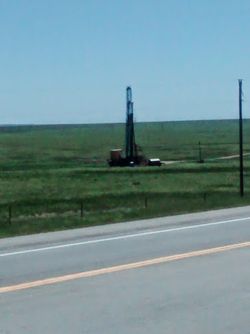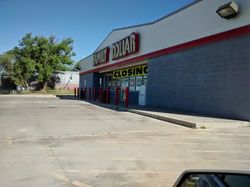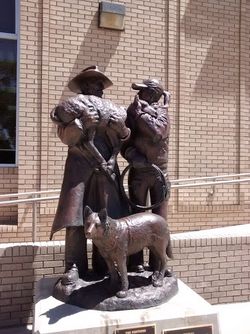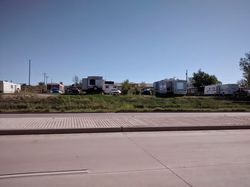Think of this as Volume 18, Number 25 of the newsletter I have written weekly since March, 1997. Enjoy.

Tornadoes and similar sudden weather events are a constant threat. Without that weather, there’s drought. The spring snow melt brings the chance of flood. But the early summer rains make everything a velvety green, and the steady wind blows cool until the late afternoon.
It’s a perfect place to observe the uneven nature of the present recovery.
To most travelers, Limon is just an I-70 freeway exit, with the usual collection of small hotels, fast food joints, and gas stations. The biggest employer is the prison just outside of town.
You wouldn't think they could grow much human capital here, but there is indeed a town a mile east of the exit, with a real town square, and real stores. If you take US 40 another 10 minutes east you'll run into Hugo, an even smaller town, which acts as the county seat. It has no fast food. The county courthouse and lock-up are its main employers.
Most years you wouldn't give either town a moment's notice.
But times are surprisingly good here.
The hotels in Limon and Hugo are full, at rising rates. There
are RVs and mobile homes clustered in packs along the roadside. Mom and pop cafes are doing a good business with simple fare like hamburgers on hand-made buns. They do a fabulous fish taco at the Turkey Crossing Cafe in Hugo, and chicken fried steak, too.
The prosperity on the street is just a small fraction of the whole. There is big money here but it's not staying. The big ranchers – and you need a big ranch to make enough to feed a decent herd of cattle – are now getting big checks for leasing land for oil development, or for the big new wind farm north of I-70. The oil companies are looking to make big profits by fracking the rocks underneath the land, turning what had long been a trickle of oil into a gusher.
That’s what all those new RVs are about, and that’s why the travelers on I-70 are told to continue on west to Denver because there is no room at these inns. These are transient workers, looking to save every penny. They stand outside the hotels at night, drinking beer straight from bottles. They bank the checks from the oil companies or drillers and look to move on when the work here is done.

The Great Recession created by the Bush Administration hit wealthy investors hard. It should have become a second “great leveling,” the period from the 1930s to the 1950s when the rich became relatively poorer, the poor relatively richer, and the great American middle class myth was born.
But President Obama and the people around him saw the suffering of a Great Depression as too high a price to bear for the benefit of bringing down the Wall Street banksters. They replaced the money lost from the vaults, passed a stimulus to create new lending, and allowed the economy to grow again under the control of the same people who crashed the ambulance.
There are now two classes of Americans, not three. There are those with capital, who have it pretty soft in the current economy, and the majority who live from check-to-check, who have it rough. Almost everyone I met here is of the latter class. While business in Hugo seems better, for instance, I was told the Girl Scouts sold fewer cookies this year than last. Commercial lots in town are going for $1,000 each. A renovated home languishes on the market for $60,000. Transient oil workers aren’t interested in putting down roots.

What happens when the oil work is done? Win or lose those workers will move on. There may be jobs with a future in maintaining the wind farm or building and maintaining a solar one, but there won’t be many. Hugo is renovating its school but most of the 130 students will move to Denver or beyond once they graduate.

Maybe one of those ranchers or drillers will take pity on Hugo and finance its effort to become a tourist trap. That would mean new growth, and new people. It might also mean a Wal-Mart and the end of the two town centers.
Or maybe these small towns can become far-off exurbs of Colorado Springs or Denver. Merchants here already drive to those cities to shop at Sam’s Club, which offers better retail prices than anyone in town can offer at wholesale.
There is hope for the future in eastern Colorado, and a real sense that things are getting better. But how much better can they get, and for how much longer? Especially for those outside the capital class.
At some point the oil work will be done, and at some point energy prices will head down. Then the land will again belong to the cattle, the pronghorn and the antelope, to the hunters and the ranchers and those who would gladly trade a city income for the peace of the countryside and the stars that are oh-so-brilliant in the night sky.










